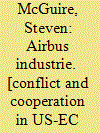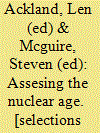|
|
|
Sort Order |
|
|
|
Items / Page
|
|
|
|
|
|
|
| Srl | Item |
| 1 |
ID:
048945


|
|
|
|
|
| Publication |
London, Macmillan Press Ltd., 1997.
|
| Description |
viii, 224p.
|
| Standard Number |
0312175329
|
|
|
|
|
|
|
|
|
|
|
|
Copies: C:1/I:0,R:0,Q:0
Circulation
| Accession# | Call# | Current Location | Status | Policy | Location |
| 039761 | 338.4762913094/MCG 039761 | Main | On Shelf | General | |
|
|
|
|
| 2 |
ID:
027958


|
|
|
|
|
| Publication |
Chicago, educational foundation for nuclear scientists, 1986.
|
| Description |
xvii, 382p.
|
| Standard Number |
0941682080
|
|
|
|
|
|
|
|
|
|
|
|
Copies: C:1/I:0,R:0,Q:0
Circulation
| Accession# | Call# | Current Location | Status | Policy | Location |
| 028141 | 355.825119/ACK 028141 | Main | On Shelf | General | |
|
|
|
|
| 3 |
ID:
120542


|
|
|
|
|
| Publication |
2013.
|
| Summary/Abstract |
The role of private non-state actors in global governance has focused largely on western actors, notably firms and non-governmental organizations. The rise of new economic powers presents us with an opportunity to consider whether and how the place of non-state actors might evolve. This is particularly true where emerging market firms are concerned, as they are the most obvious manifestation of the shift in economic power away from the developed West and Japan.
The article suggests, however, that the current international system satisfies most of the demands that firms from rising powers might make, so they have little incentive to define their policy preferences in opposition to established powers. They can conduct political activity across a range of avenues, from multilateral institutions to regulatory bodies overseeing technical aspects of business operations.
Indeed, the disaggregation of modern capitalism makes the last route particularly important and attractive for firms. As such, they do not need to frame their policy demands solely - or even mainly - in terms of balancing against western economic dominance.
For non-governmental organizations, the emerging power structure has eroded their previous role of advocates for developing economies. The economic growth of emerging markets has, however, given NGOs an opportunity to work with multinationals in the provision of public goods.
|
|
|
|
|
|
|
|
|
|
|
|
|
|
|
|
| 4 |
ID:
050806


|
|
|
|
|
| Edition |
2nd ed.
|
| Publication |
London, Routledge, 2004.
|
| Description |
xviii, 326p.
|
| Standard Number |
0415310172
|
|
|
|
|
|
|
|
|
|
|
|
Copies: C:1/I:0,R:0,Q:0
Circulation
| Accession# | Call# | Current Location | Status | Policy | Location |
| 047879 | 382.3/HOC 047879 | Main | On Shelf | General | |
|
|
|
|
| 5 |
ID:
079070


|
|
|
|
|
| Publication |
2007.
|
| Summary/Abstract |
For all its success in other high-technology sectors, Japan has largely failed to develop a strong aerospace sector. Its leading firms do not market finished aircraft and, in stark contrast to other sectors, the aerospace industry features a trade deficit with the United States. Japanese firms seem trapped as suppliers of components and sub-assemblies, mainly for the US industry. The general explanation for this state of affairs is that the Japanese industry has been effectively 'captured' by the United States; Boeing in particular dominates the sector and has effectively locked the Japanese firms into a relationship where moving up the value chain is difficult. This relationship may be changing. Japan's government has placed renewed emphasis on developing Japan's aerospace sector, while matters are evolving at the corporate level too, with Boeing's relations with Japan revealing a steadily increasing work share for the Japanese industry. The rise of Asia as an important market, and technological change making aerospace more like other manufacturing industries, presents Japanese firms with new incentives and opportunities beyond the US relationship.
|
|
|
|
|
|
|
|
|
|
|
|
|
|
|
|
|
|
|
|
|